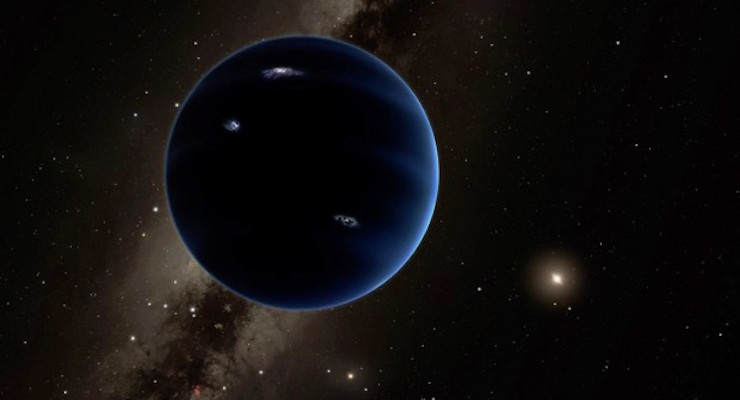

This artistic rendering shows the distant view from Planet Nine back towards the sun. (Credit: Caltech/R. Hurt)
The solar system may host a ninth planet that is about 10 times bigger than Earth and orbiting far beyond Neptune, according to research published on Wednesday. Scientists at the California Institute of Technology announced they had uncovered evidence of a giant planet existing beyond Pluto in the outer solar system.
Computer simulations show that the ninth planet, that is if it exists, would have an orbit roughly 20 times larger than the Earth’s orbit around the sun. As of now, the planet has not been observed directly. Instead, scientists have used computer simulations and observed gravitational impacts to draw the conclusion.
“This would be a real ninth planet,” researcher Mike Brown said in a press release. “There have only been two true planets discovered since ancient times, and this would be a third. It’s a pretty substantial chunk of our solar system that’s still out there to be found, which is pretty exciting.”
Brown and co-researcher Konstantin Batygin, an astronomer also at Caltech, were skeptical of the prospect that such a large planet would have eluded detection all this time. But they modeled the hypothetical planet’s gravitational effects on more than a dozen distant objects in the Kuiper Belt and found a near-perfect match.
“Still, I was very skeptical,” Batygin said. “I had never seen anything like this in celestial mechanics.”
The computer model also predicted the location of other objects beyond Neptune in a region known as the Kuiper Belt, which were also found in archived surveys, as well.
“Basically it shouldn’t happen randomly,” Brown explained. “So we thought something else must be shaping these orbits.”
At that point, “my jaw sort of hit the floor,” Brown added.
Batygin said the potential discovery would mean our solar system is more normal than scientists previously believed. Most planets in other solar systems don’t have a single orbital range and are much larger than Earth.
“One of the most startling discoveries about other planetary systems has been that the most common type of planet out there has a mass between that of Earth and that of Neptune,” Batygin explained. “Until now, we’ve thought that the solar system was lacking in this most common type of planet. Maybe we’re more normal after all.”
Brown’s earlier research helped to demote Pluto in 2006 as the solar system’s ninth planet after other small, icy bodies were found beyond Neptune.
“All those people who are mad that Pluto is no longer a planet can be thrilled to know that there is a real planet out there still to be found,” he said.






